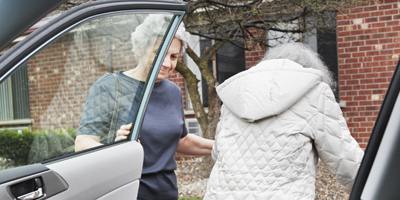Long-Distance Caregiving
In today's world, many families are geographically spread apart. And we are not always able to provide the hands-on care we would like. While living at a distance can complicate caregiving, there are resources to help.
Locate programs and services for the person living with dementia
Finding resources and arranging services from afar can be a challenge. Use our Community Resource Finder to locate services that serves the area the person with dementia lives in.
Quick tips and resources
Taking care of concerns, such as a family member's safety, nutrition and health, can be difficult when you don’t live nearby. There are numerous ways to provide caregiving support from a distance, such as emotional support, making medical appointments, researching services in the community, visiting when possible to give day-to-day caregivers a break, or managing finances.
Being prepared and helping organize services and can go a long way in helping coordinate care from a distance.
- Identify resources and use them. Learn about what is available in your community by contacting your local Alzheimer's Association at 800.272.3900 or using our online Community Resource Finder. Whether you’re living with memory loss or caring for someone who is, ALZNavigator™, an online interactive tool, will guide you to your next steps.
- Reassess care needs during each visit. Dementia is a progressive disease, and care will need to be adjusted over time. While someone in early-stage Alzheimer's may live independently, by the middle stage, 24-hour supervision will be required. Each time you visit, assess the situation to make sure your family member with dementia’s care needs are being met. Check in with family providing day-to-day care about any support they might need.
- Keep communication going. As a long-distance caregiver, you may coordinate many moving parts. Whether with informal caregivers such as family and neighbors or with home health aides and other services, set aside time to regularly discuss the needs of both the person living with dementia and caregivers. If the individual living with dementia lives at a long-term care community, set up a regular time with the managing nurse or physician to get updates, and maintain ongoing communication with care staff and friends who visit regularly.
- Gather pertinent information and keep it handy. Make sure you have contact information for physicians, pharmacies, care providers and neighbors, as well as important financial and legal documents easily accessible in case they are unexpectedly needed.
- Be kind to yourself. Living out of town does not mean you aren't involved or that you don't care. Get support by connecting with others who are long-distance caregivers through our online community.
Supporting your family from afar
Many families live long distances from one another and caregiving from afar is more prevalent today than ever. Even when you don’t live nearby, you can be actively involved and take on meaningful roles.
Whether the person living with dementia lives at home alone, with a family member, in an assisted living center or in a long-term care community, family members and friends who provide day-to-day care may have difficult days. Don’t underestimate the importance of supporting your family from a distance.
Assessing care needs
Early-stage care
Ask yourself:
- Is there food in the refrigerator? Is it spoiled? Is the person eating regular meals?
- What is the condition of the inside and the outside of the home? Has it changed?
- Are the bills paid? Are there piles of unopened mail?
- Do friends and relatives visit regularly?
- What is the person's personal appearance? Is the person bathing and grooming?
- Is the person still able to drive safely?
- How are family caregivers who live nearby? Do they have the information and support they need?
Learn more: Dementia and Driving, In-Home Care, Early-Stage Caregiving
Coast-to-coast support
MSNBC News anchor Richard Lui is a long-distance caregiver for his father.
Middle-stage and late-stage care
Early in the middle stages, it will become too difficult or dangerous for a person with Alzheimer's to be left alone. The person will need supervision around the clock. During the late stages, around-the-clock care needs will become more intensive. There are several care options, including having a caregiver provide care in the home, moving the person into the home of a relative or moving the person to a long-term care community.
Regardless of which care arrangement you use, periodically assess the situation to make sure the needs of both the person living with dementia and family caregivers are being met.
Ask yourself:
-
Is the person getting the help he or she needs with daily personal care, such as dressing, bathing and grooming?
-
Have safety precautions been taken throughout the living environment? Do additional precautions needs to be taken?
-
Does the person have safe transportation to doctor's appointments and other events?
-
Is the person engaged in meaningful activities during the day?
-
How are family caregivers doing? Are they getting burned out? Is their health being affected? Would they benefit from respite care or other supports?
Learn more: Care Options, Middle-Stage Caregiving, Late-Stage Caregiving
Moving the person into your own home
If you're considering moving the person into your home, here are some things to think about:
-
Does he or she want to move? What about his or her spouse?
-
Is your home adapted to support the person?
-
Will someone be at home to care for the person?
-
How does the rest of the family feel about the move?
-
How will this move affect your job, family and finances?
-
What respite services are available in your community to assist you?
-
How will providing direct care for a person with dementia impact your own health?
Moving a person with Alzheimer's disease from familiar surroundings may cause increased agitation and confusion. Make sure to talk with the person's physician, care team or a social worker. You can call the Alzheimer’s Association for assistance before making a decision.
Coordinating care
Building a list of contacts and local resources is vital when coordinating care from a distance. Having trusted eyes close at hand is also essential to make sure care needs are being met.
-
Family, friends and neighbors. Make a list of phone numbers and addresses. Ask if you can check in with them to find out how your family member is doing. They may be willing to stop by the person’ living with dementia’s home for regular visits. There are a number of online calendars available to help coordinate caregiving support from friends, family and neighbors. .
Use these resources to build your care team
Building a support network is an important step for caregivers to take. Check out several free online care calendar resources that families can use to build their care teams, share tasks and coordinate helpers. -
The health care team. Keep in contact with the primary physician and other key members of the health care team overseeing care, and make sure they can reach you if there are significant changes or concerns about your family member's mental or physical well-being. Your family member will need to sign a release of information so health care providers are free to communicate with you.
-
Community organizations. Check with local churches, temples, neighborhood groups and volunteer organizations. They may provide meal delivery, transportation or companion services.
-
Aging agencies. You may be able to access services to help with meals, chores and transportation through your local area agency on aging. These agencies will often provide referrals to local resources. To locate your area agency, see our Community Resource Finder.
-
Home and community-based services. Services such as home care and adult day services are available in most communities and can be arranged based on the person’s needs. These services can help with personal care activities, bathing, meals and medications and provide respite for caregivers. Adult day services and other congregate services also offer opportunities for socialization.
-
Geriatric care managers. These elder care experts specialize in assessing and monitoring the needs of the elderly. To find out more about their services, visit the Association of Professional Geriatric Care Managers website or call 520.881.8008.
-
Trusted professionals. Elder law attorneys work with older clients and their families to get legal documents in place for making health care, legal and financial decisions.
Making the most of visits
Few long-distance caregivers are able to spend as much time with the person living with dementia as they would like. The key is to use your time effectively:
-
Make appointments with the person's physician, lawyer and financial adviser during your visit to participate in decision-making.
-
Meet with neighbors, friends and other relatives to hear how they think the person is doing. Ask if there have been any behavioral changes, health problems or safety issues.
-
Take time to reconnect by talking, listening to music, going for a walk or participating in activities you enjoy together.
-
Check the person's cupboards and refrigerator to make sure there is enough appropriate food.
-
Review medications to make sure they are being taken as prescribed.
-
Assess the support needs of family caregivers providing day-to-day care.
Learn more: Activities, Communication
Related Pages

Community Resource Finder

Adult Day Centers
Adult day centers offer people with Alzheimer's and other dementias the opportunity to be social and to participate in activities in a safe environment.

Changing Care Providers
Get resources to help with the transition between one type of care to another.

Choosing Care Providers
Learn about assessing a person's care needs and finding, contacting and screening care providers.

The Alzheimer’s Association is in your community.
Find Your Local Chapter
Connect with our free, online caregiver community.
Join ALZConnected
